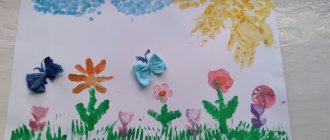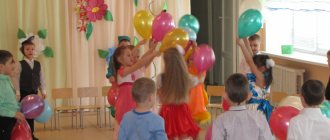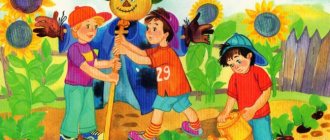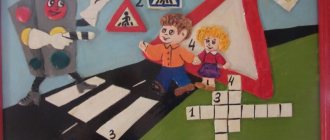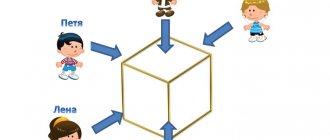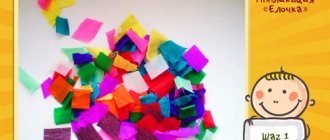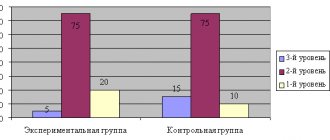This teaching material on the topic “Musical Summer” was created with the aim of organizing leisure time for preschoolers in the summer, and to involve children in organizing and conducting thematic events.
Summer is rich in calendar and folk holidays, such as Russia Day, Family Day, Love and Fidelity, and industry professional holidays. Pupils learn a lot of new and interesting things over the summer period. Expanding children's horizons through play has a beneficial effect on the child's development and adaptation and shapes the preschooler's understanding of society and the world around him.
More details about the material:
In summer, all continuous educational activities in kindergarten take place in the fresh air.
There are many activities for preschoolers: entertainment, game programs, quizzes, puppet and theatrical performances. The developed project for holding events in preschool educational institutions in the summer is designed for the artistic and aesthetic development of children, strengthening physical, mental and social health, and developing their cognitive, communicative, and creative abilities.
Project type: creative, communicative and educational.
Implementation timeframe: medium duration (3 months: June - July - August). Project participants: music director, group teachers, children (all groups). Children's age: 3–6 years.
Goal: To develop creative abilities in the summer based on diverse activities.
Tasks:
- To interest preschoolers in the uptake of cognitive, artistic and creative activities;
- cultivate an emotionally positive attitude towards entertainment and holidays, create an atmosphere of joy;
- develop emotional sensitivity, emotional response to musical works, the beauty of the surrounding world, works of art.
- Develop interest in various types of visual activities;
- develop musical abilities: hearing, memory, rhythm, musical taste;
- promote children's health;
- develop motor, mental, intellectual, creative abilities of pupils in a variety of activities;
- to form a positive emotional state of all participants in the educational process;
- ensure integrative activities of children, preschool teachers, parents and large families.
- Cultivate interest in the sound world.
- Feeling empathy for the characters.
- Develop observation and ingenuity.
- Instill artistic and aesthetic taste through classical music.
Relevance of the project. The project offers ample opportunities for the artistic and aesthetic development of children, strengthening physical, mental and social health, and developing their cognitive, communicative, and creative abilities.
Expected results:
For children: expanding ideas about summer based on artistic, aesthetic and musical activities.
For teachers: introduction of innovative technologies in working with children, personal and professional growth.
For parents: awareness of their need and importance in the educational activities of the kindergarten in the development of children according to the Federal State Educational Standard in five areas (cognitive development, speech development, social and communicative development, physical development, artistic and aesthetic development)
Stages of work on the “Musical Summer” project
1st stage (preparatory):
Identification of a problem situation: how to interest and captivate children in the summer in kindergarten?
Stage 2 (project development)
Drawing up a calendar-thematic plan for “Artistic and Aesthetic Development”, type of activity “Music” and developing joint activities with children and teachers. Preparation of entertainment: “Russia Day”, “Mushroom Week”, “City Week”, “Family Week”, “Cautious Pedestrian”, “Creativity Week”, “Dance Week”.
Preparation of musical and didactic games for the entertainment of preschoolers; preparation of a musical presentation on the topic “Shchyolkovo is my hometown” using ICT tools; preparation of a presentation “Riddles about the seasons”; writing entertainment scripts and the final event “Talent Festival”; selection of materials and equipment, various games and other activities (drawing on asphalt).
Selection of songs, musical games, dance compositions related to the theme of the project:
Stage 3 (project implementation)
Activities with children:
1. Conversations about summer as a season, learning poems (teachers): T. Bokov “Hello, summer!”; V. Stepanov “Hello, forest!”; I. Surikov “Summer”; S. Marshak “Green Page”; M. Moravskaya “Two Beetles”; A. Usachev “Ladybug”; O. Kuznetsova “Bumblebee”; M. Petrova “Grasshoppers... Who are they”; A. Fet “Butterfly”.
2. Repetition of children's songs, round dances, dances, musical games at the choice of the music director, for example:
Round dance “We went to the meadow”, music by A. Fillipenko; “I have an aunt” dance; “The deer has a big house” - game; “Let’s go through the raspberries to the garden”, music by A. Fillipenko; “A grasshopper sat in the grass ", music by V. Shainsky; "Song of the Lion Cub and the Turtle", music by V. Shainsky; "The Happiest", music by Y. Chichkov.
3. Acquaintance with classical musical works in which the composer depicts summer through musical means: P. I. Tchaikovsky. Cycle of pieces for piano “The Seasons” by E. Grieg. Piano piece “Butterfly” by A. Vivaldi. Suite “Seasons” (“Summer”).
4. Acquaintance with works of fine art “Summer in the paintings of Russian artists of the Wanderers” using a multimedia projector, screen (music director, teachers): I. Levitan “Birch Grove”; A. Plastov “Haymaking”; I. Shishkin “Rye”; F. Vasiliev “Wet Meadow”; V. Polenov “Overgrown Pond”; A. Vasnetsov “Motherland”; I. Shishkin “Morning in a Pine Forest”; I. Levitan “At the Pool”; I. Repin “Summer Landscape”.
5. Learning dances at the choice of the music director, for example: “White Birds”, “Childhood” songs “My Russia”; “Red, White, Blue”; “The World is Like a Colored Meadow”, “Kalinka” (with spoons).
6. Conducting outdoor dance games and flash mobs: “Sun and Rain”; “Blue Car”; “Song about Summer”; “My Family”; “City of Childhood” (flash mob).
7. Carrying out games: “Who will collect the most flowers?”; “Boys - girls”; “Where did the butterfly fly?”, “Butterflies and flowers”, “Collect the Chamomile”.
Plan of events during the summer recreational period of the 2018-2019 academic year.
| event title | Dates | Expected result | Responsible |
| 1.Russian Independence Day (Fig. 2, 5) | June 11 | Cultivate love for the homeland. Create a joyful mood | Musical director Puryskina A.S. Educators Sargsyan L.A. Voronkova N.A., Zinovieva L.A. |
| 2.Fun with group balloons | 21st of June | Intensify children's recreation. Consolidate the knowledge acquired in music classes. | Musical director Puryskina A.S. Teacher Sargsyan L.A. |
| 3. Fun on the street Soap bubble festival Senior age | June 28 | Develop the ability to rejoice with friends. To promote the accumulation of knowledge of modern dances and games. Develop the ability to expressively perform previously learned songs | Musical director Puryskina A.S. Educators Sargsyan L.A. Voronkova N.A., Zinovieva L.A. |
| 4. Entertainment “The radiant sun come to us” | 5'th of July | Bring joy and pleasure from entertainment. Activate the perception of music and movements in musical games and dances. | Musical director Puryskina A.S. |
| 5. Leisure activity “Day of Family, Love and Fidelity” (Fig.  | July 8 | Organize fun leisure time for children, develop children's knowledge about family and home. Encourage the child to perform songs learned during the year, to realize their abilities in dancing and musical games. | Musical director Puryskina A.S. Educators Sargsyan L.A. Voronkova N.A., Zinovieva L.A. Dzhumakhmedova O.S. |
| 6. Entertainment “Follow the safety rules healthy, grow strong” (Fig. 3) | July 18 | Organize fun leisure time for children, develop children's knowledge of correct behavior on the road and at home. Encourage the child to perform songs learned during the year, to realize their abilities in dancing and musical games. | Musical director Puryskina A.S. Educators Sargsyan L.A. Zinovieva L.A. |
| 7. Theatrical performance “How the sun collected rays” (Fig. 4,7) | August 9 | Organize fun activities for children. Encourage the child to perform songs learned during the year, to realize their abilities in dancing and musical games. | Musical director Puryskina A.S. Educator Shadrina T.A |
| 8. Fun on the street. Dance Festival 2019 (Fig. 6) | August 15 | Intensify children's recreation. Encourage the child to realize his abilities in dancing and musical games | Musical director Puryskina A.S. |
| 9. Entertainment “Happy Journey” (Fig. 1) | July 22 | Create a joyful mood. Activate the perception of music and movements in musical games and dances. | Musical director Puryskina A.S. Teachers Shadrina T.A., Krivoruchko I.Yu. Zabolotnova M.F., Shekhovtsova N.N. |
| 10. Game - quiz “My Favorite City” | July 11 | Consolidate knowledge about your hometown. Foster a sense of pride in your city. Develop a desire to explore your native land. Bring children joy and pleasure through songs and games. | Musical director Puryskina A.S. Teachers Shadrina T.A., Krivoruchko I.Yu. Zabolotnova M.F., Shekhovtsova N.N. |
Project results.
Saturating children's free time in the summer with a variety of musical, artistic, aesthetic, and cognitive activities.
Product of activity: Carrying out holidays and entertainment, talking about summer; about family; about the city. Scenario development; Photographic materials; Discussion of results with teachers; Children's impressions. photo report on the kindergarten website; presentation at the pedagogical council.
Bibliography
- A.I. Burenin "Rhythmic mosaic".
- S.I. Merzlyakov “The Magic World of Theater” (for children 5-7 years old).
- Magazines “Musical Director”: No. 1,3,4,5 – 2004, No. 1,4,6 – 2005, No. 4,5 2006, No. 1 – 2007.
- Long-term planning.
- O.P. Radynova. "Musical Masterpieces" Author's program and methodological recommendations. – M. 2004
- O.P. Radynova. A.I. Katinene. M.L. Palavandishvili. Musical education of preschool children. — M. 1999
- ON THE. Sorokin “Theater, creativity, children.”
Rice. 1 Entertainment “Fun Journey”
>
Rice. 2 Leisure “Russia Day”
Rice. 3 Entertainment “Follow the safety rules - grow up healthy and strong”
Fig. 4 Theatrical performance “How the sun collected rays”
Fig.5 Leisure activities “Russia Day”
Fig.6 Leisure “Dance Festival 2019”
Fig. 7 Theatrical performance “How the sun collected rays”
Fig.8 Leisure “Day of Family, Love and Fidelity”
If you liked the page, share it on social networks:
Organization of a musical festival in a preschool educational institution
Organizing a musical holiday in a preschool educational institution Making a children's holiday unforgettable , opening a window to the world of amazing wonders, magical sounds and colors for children, leaving a bright mark on the child's soul is the task of teachers and parents!
A holiday in kindergarten is a day that differs from others in the decoration of the premises, elegant clothing for adults and children, inviting guests, surprises and gifts.
Organizing any holiday includes the following preliminary work:
— careful selection of script and actors;
- selection of musical and literary material that corresponds to the theme of the holiday and the age characteristics of the children;
— learning musical and literary material with children and teachers;
— conducting rehearsals;
— production of costumes and scenery;
— selection of phonograms; specialist. effects (light; sound, etc.)
;
The script is written the music director and presented to teachers for discussion one and a half to two months before the upcoming event, which allows you to prepare for the holiday . Teachers not only get acquainted with the script, but also distribute roles among themselves. The entire teaching staff participates in organizing the music room , making decorations and costumes. The music director monitors and coordinates all stages of preparation for the event, both with children, teachers and parents.
At the heart of each holiday is a certain idea that should be conveyed to every child. This idea should run through the entire content of the holiday music , dances, round dances, dramatizations, and decoration serve to reveal it
The idea of the holiday will be conveyed to every child if it is revealed using artistic material accessible to children, taking into account their age and individual characteristics. This is achieved, first of all, by careful selection of the repertoire (poems, songs, dances, etc.)
for children of every age group.
At the same time, the children’s existing repertoire, the level of development of their vocal and motor skills, and interests are taken into account. Finally, speaking about the availability of the holiday , you should also remember about the time of its holding. Holidays are held both in the morning and in the evening, and their duration is regulated by age and sanitary requirements. In children of the younger and middle groups, fatigue occurs much earlier than in older preschoolers. Kids are able to comprehend a much smaller number of poems, songs, etc. Therefore, the duration of the holiday for them should not exceed 20-30 minutes.
For older preschoolers, its duration increases to 45-55 minutes. and the repertoire becomes much richer and more diverse. The construction of matinees for children has its own unique features. It uses material covered in music classes and well mastered. Therefore, when finding themselves in a new, unusual environment, children feel natural and at ease, sing well, dance, and are active, performing familiar actions. Various spectacular moments, interspersed with children's performances, also arouse interest. For the little ones, their simplest expression is showing and playing with colorful attributes and toys. Puppet theater characters often appear in scripts for children. In nursery and junior groups, the leading role is played by an adult. He constantly guides not only the children’s actions, but also their perception. The adult fixes the children's attention on the appearance of new characters, allows them to have a good look at them, then begins to take action: they sing, dance, and play together with everyone, which gives the kids confidence in their actions. At the holiday for the second junior or middle group, a small ceremonial part is introduced. Children sing songs, play, and there is a surprise moment at the end. In the middle group, children have more opportunities to express themselves in individual performances, and this can be not only reading poems, but also showing simple dramatizations, small dances, playing musical instruments, etc. n. Children of these groups are largely independent, they already have some experience of behavior at holidays , however, they also need the help of an adult; dances and games are performed by demonstration, they sing songs together with the teacher.
Children of senior and preparatory groups are characterized by greater activity in performing activities. The colorful decoration of the room, various attributes, costumes of the characters - all this attracts the attention of the children. They themselves notice the details of the design, etc. At matinees, the children of these groups largely act independently, without the help of a teacher, confidently carry out familiar games, dances, and participate in performances. They freely navigate the team, monitor the correct execution of the actions of their comrades.
At the same time, there are always children in the group who learn program material more easily and quickly than others, and their further development requires the use of more complex works. Such children can be assigned more complex roles, based on the performance of songs and dances, allowing them to more fully demonstrate their abilities.
The musical repertoire included in the scripts is learned in regular music classes . When selecting musical material , you should be guided by the following criteria:
- selection of highly artistic musical material and its full performance (themes, nuances, etc. cannot be distorted)
;
— compliance with sound load standards when using phonograms and sound effects;
— correspondence of musical illustrations with the general character and individual moments of the matinee
The holiday repertoire can be used as recommended by the “Program”
and additional.
It is important that it be artistic and meet program requirements. Often the matinee program includes a performance by a children's orchestra. Playing children's musical instruments has great educational and educational significance, it develops hearing, musical memory , sense of rhythm, and instills responsibility, organization , and attention in children. But a children's orchestra is not an end in itself. This is the result of a lot of work, and, of course, playing musical instruments is not included in the program of every matinee.
At the beginning of the year, when children do not yet have the skills to play instruments, there is no learned repertoire, no teamwork, the orchestra should not be included in the script, since participation in this performance will be accompanied by tension and self-doubt for the children. Dramas, group dances, and solo songs are learned individually. Such classes do not last long and are held in the afternoon.
Children love to perform poetry at a festive matinee . But it is impossible to satisfy everyone who wants it in one day. Therefore, it is necessary to schedule the performance of children who are not occupied in other numbers of the holiday program . The matinee program should be structured so that children have the opportunity to see the whole holiday and participate in the general fun.
Throughout the year, responsible, leading roles must be assigned to different children, consistent with their capabilities and character. Repeated performance by some leads to excessive anxiety and tires their nervous system. Children who do not participate in the general joy lose interest in the holiday : they worry, lose faith in their strengths and withdraw into themselves even more. For each child there must be a role, albeit insignificant, small, in the script. The words of the presenter, congratulations, performances by children of another group, surprise moments, children should see and hear only at the holiday . Then this material arouses their interest, attention, and desire to take part in the holiday .
To maintain the freshness and brightness of the perception of the holiday , it is not necessary to conduct general rehearsals with children; you should try to avoid any kind of “training” and repeated repetitions of the repertoire.
of the music hall an important role in organizing festive events . to decorating the music room of a kindergarten:
- safety;
— compliance with the theme and content of the script, the age capabilities of the children;
- aesthetics, mobility.
For registration we use:
— planar models (drawings, applications, etc.)
;
- three-dimensional decorations (trees, garlands, houses, etc.)
;
- draperies made of fabrics of different colors and textures;
- children's work.
In fact, all children's holidays are somewhat similar . They take place in a music hall , decorated thematically depending on the specific event. Absolutely all have a musical , dance and gaming component. That is, children sing songs in chorus to the music , dance (dance in a round dance, stomp, clap their hands, dance in pairs, etc.)
and take part in a play scene - for example, throwing
“snowballs”
on the occasion of the New Year or collecting
“fallen leaves”
on
the autumn holiday . In addition, some children read poetry. And the final stage of any holiday is the obligatory awarding of gifts.
The holidays most often celebrated in kindergarten are highlighted
Seasonal: Autumn, spring, summer holidays .
State and civil: New Year, Defender of the Fatherland Day, International Women's Day, Victory Day, Knowledge Day.
Folk and folklore: Maslenitsa (farewell to winter)
.
International: Children's Day, International Women's Day.
Not only school students, but also preschoolers begin counting down the school year on September 1. The organization of “Knowledge Day” in kindergarten, called “Growing Up Day,” has also become traditional.
. Children remember the songs and dances they completed last school year. They also play and improvise to new compositions.
When else can you enjoy such an abundance of fresh fruits and vegetables than in the fall? September-October is the time of bright colorful leaves. It’s also hard to pass by without picking up at least one. In addition, autumn is a riot of bright colors. Yellow, green, brown, red are the colors of this time of year. Festival in kindergarten is one of the favorite holidays , because it is during the festive matinees that children can have fun, look at others, and show themselves. But still, holiday is a special event, because it is on this day that children bring crafts from the gifts of autumn: fruits, vegetables, natural materials. Thus, they say goodbye to the hot summer days and to commemorate this they sing songs, dance, and act out skits.
A modern mother's day is scheduled literally minute by minute. At the same time, time to communicate with the child, unfortunately, is reduced to a minimum. Taking this into account, the role of joint activities with parents in preschool educational institutions increases significantly. On the last Sunday of November
.
In kindergarten it can be held on the last Friday of November. It is considered very important to celebrate this holiday of mothers , which emphasizes their role not as women, but as the closest and dearest people to their child.
Childhood is a happy time of life, when a fairy tale becomes reality, dreams come true and miracles happen. As you know, children await the New Year with special trepidation, so a magical atmosphere, costumes of fairy-tale characters and colorful decorations should be integral elements of the holiday . The center of the New Year's celebration is a Christmas tree sparkling with lights and toys. The beauty of spruce usually captivates children so much that the holiday can only begin with it. To the sound of cheerful music , preschoolers and their teacher enter the hall and look at the Christmas tree and its festive attire . Children sing funny songs, dance in circles, but the most important thing begins with the appearance of Father Frost and the Snow Maiden. They bring with them jokes, fun, games, riddles, fabulous miracles and, of course, gifts.
Defender of the Fatherland Day. Holiday is of great educational importance for children; it is not large-scale, but it helps to reveal the significance of events, bring them closer to understanding the idea and, through active participation, involve them in the national celebration. In our country, this holiday , like the Birthday of the Red Army, has been celebrated since 1922. In school it can take place in the form of musical leisure ; thematic or complex lesson; matinee. to the holiday , who can “host the parade”
, conduct a conversation, games and attractions, participate in the work of the jury during games and competitions.
program includes songs , dances, games, poems, and playing children's musical instruments . The attributes and costumes bring children a lot of joy - caps, budenovkas, helmets, caps... The games are decorated brighter than in the classroom. An interesting point is the arrival of guests (museum workers, libraries, veterans)
.
Children prepare drawings and cards for guests and their dads, because historically, men were the defenders of the country, first of all, so they accept congratulations on this holiday .
The idea of the holiday is International Women's Day, glorifying women, their role in the life of the country, nurturing love for mother. On this day, not only mothers are glorified, but also teachers, nannies... - all women. The celebration is distinguished by a special mood: warmth, spontaneity of communication between children and mothers and grandmothers. You can hold this holiday in different forms , for kids it is a regular matinee, and for older groups the most common forms are a musical and literary concert , a complex, integrated lesson or theatrical performance, or in the form of a competition “Miss kindergarten!”
The holiday ends with the distribution of gifts made by children for relatives.
On the eve of Lent, I want the children to have a lot of fun in the fresh air. Maslenitsa is celebrated in the kindergarten yard . are organized on the site of each group . Gradually walking around the kindergarten building, the children take part in all the games over and over again and receive a charge of joy, vigor, confidence in their strength and dexterity. At the end of all the fun, the ritual of burning the effigy takes place. This is how they say goodbye to winter and welcome spring.
Victory Day in the Great Patriotic War remains one of the most revered and significant holidays in our country . The first Victory Parade on Red Square took place on June 24, 1945. According to tradition, on Victory Day, front-line soldiers meet, wreaths are laid at the monuments of Glory and military valor, and festive fireworks . Traditional holidays in preschool educational institutions in honor of this day are a good opportunity to tell children about the events of bygone days, to instill in them love for the Motherland, pride in their compatriots who gave their lives on the battlefield for the sake of peace on Earth.
One of the most memorable holidays for both children and their parents, as well as for preschool employees, is graduation. On the one hand, this is a joyful, long-awaited holiday , on the other, a slightly sad event. The teachers are happy that their students are moving to a new stage in life, but they are sad that they have to part with such lovely children who have already become family. Graduation in kindergarten is the first real big holiday for a child . Leaving the walls of the kindergarten, he enters a new life, where school and the proud title of first grader await him.
Link to resource: https://www.maam.ru/detskijsad/metodicheskaja-razrabotka-organizacija-muzykalnogo-prazdnika-v-dou.html
